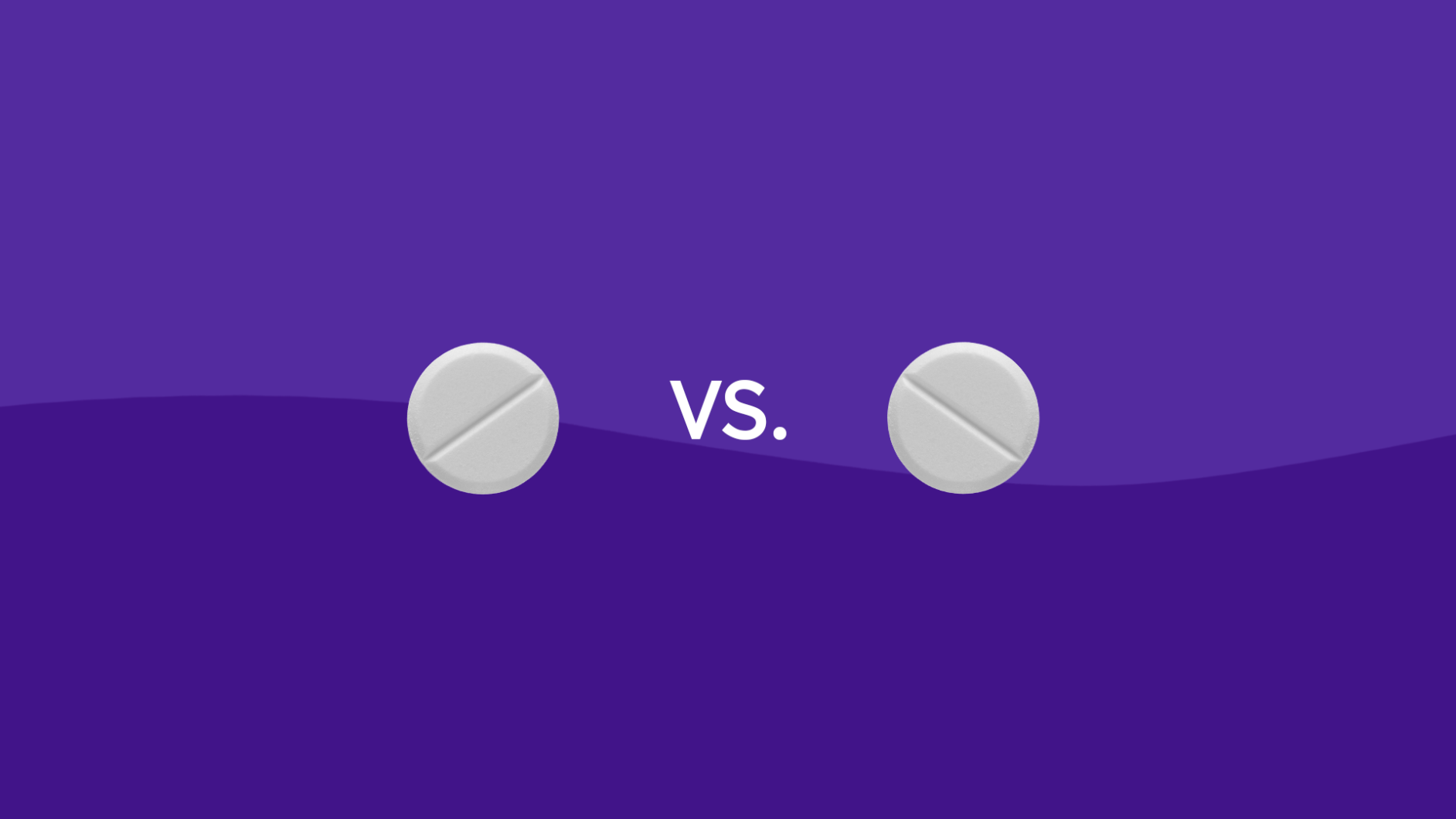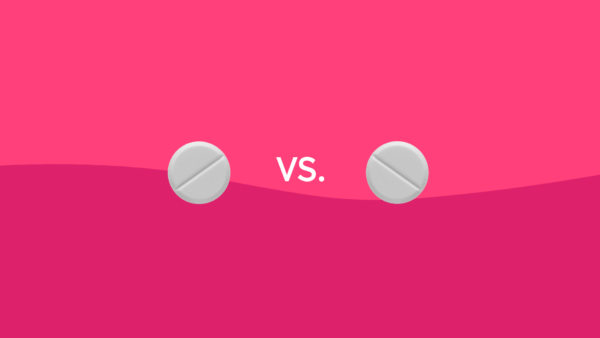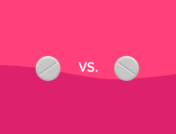Drug overview & main differences | Conditions treated | Efficacy | Insurance coverage and cost comparison | Side effects | Drug interactions | Warnings | FAQ
Concerta (methylphenidate) and Adderall (amphetamine/dextroamphetamine) are two stimulant medications that can treat ADHD, or attention deficit hyperactivity disorder. For many people living with ADHD, behavioral therapy and prescription stimulants are effective treatments. While there are several stimulant drugs available, it can sometimes be hard to find the best option.
CNS (central nervous system) stimulants work in similar ways by blocking the reuptake of dopamine and norepinephrine in the brain. By blocking their reuptake, Concerta and Adderall can boost the effects of these neurotransmitters to help improve focus and attentiveness. Although these ADHD medications work in similar ways, they are not the same.
Concerta and Adderall have some differences in how fast they work, how long their effects last, and how they’re formulated. Learn more about their differences so you can be empowered to work with your doctor to find the best treatment for you or your child.
What are the main differences between Concerta and Adderall?
The primary difference between Concerta and Adderall is that Concerta contains methylphenidate and Adderall contains amphetamine salts. More specifically, Adderall contains a combination of amphetamine and dextroamphetamine.
Compared to Adderall, Concerta’s effects last longer and release more slowly over time. Concerta is taken once daily while Adderall needs to be taken multiple times throughout the day.
With its advanced trilayer formulation, Concerta starts working within one hour after the first tablet layer is dissolved. Then, the drug is gradually released over time with peak levels reached over six to 10 hours.
Unlike Concerta, the peak levels of Adderall are reached within three hours after taking it. For this reason, immediate-release Adderall is usually taken every three to four hours.
RELATED: Concerta details | Adderall details | Methylphenidate details
| Main differences between Concerta and Adderall | ||
|---|---|---|
| Concerta | Adderall | |
| Drug class | CNS stimulant | CNS stimulant |
| Brand/generic status | Brand and generic versions available | Brand and generic versions available |
| What is the generic name? | Methylphenidate | Dextroamphetamine/amphetamine salts |
| What form(s) does the drug come in? | Oral tablet, extended-release | Oral tablet Oral capsule, extended release |
| What is the standard dosage? | 18 or 36 mg once daily in the morning.
Dosage may be increased by 18 mg at weekly intervals not to exceed 54 mg per day in children and 72 mg per day in adolescents and adults. |
5 to 40 mg once in the morning and then every four to six hours as directed by a doctor.
Dosage may be increased by 5 mg at weekly intervals not to exceed 40 mg per day. |
| How long is the typical treatment? | The duration of treatment is based on your doctor’s clinical judgment. Treatment is usually long-term. | The duration of treatment is based on your doctor’s clinical judgment. Treatment is usually long-term. |
| Who typically uses the medication? | Adults and children six years of age and older up to 65 years of age | Adults and children three years of age and older |
Want the best price on Adderall?
Sign up for Adderall price alerts and find out when the price changes!
Conditions treated by Concerta and Adderall
Concerta is FDA-approved to treat ADHD in adults, adolescents, and children aged 6 years and older. For older patients aged 65 years and older, Concerta is not usually recommended.
The main symptoms of ADHD include inattention, hyperactivity, impulsiveness, and short attention span. Those with ADHD may also experience other behavioral, cognitive, and mood-related symptoms.
Adderall is FDA-approved to treat ADHD in adults and children. It is also approved to treat narcolepsy, a sleep disorder characterized by excessive daytime sleepiness and intense episodes of sleep attacks. Those with narcolepsy are often started on Provigil (modafinil) before trying another drug like Adderall.
Concerta and Adderall may also help treat people with ADHD and other mental health problems like depression, anxiety, and/or bipolar disorder. However, their off-label use for these conditions may be considered controversial and is still being studied.
| Condition | Concerta | Adderall |
| ADHD | Yes | Yes |
| Narcolepsy | Off-label | Yes |
| Depression, anxiety, or bipolar disorder associated with ADHD | Off-label | Off-label |
Is Concerta or Adderall more effective?
Concerta and Adderall are both effective medications that can treat ADHD. However, one drug is preferred over the other in some instances.
In a 2018 meta-analysis, it was found that methylphenidate may be better for children and adolescents as a first-line treatment of ADHD. For adults with ADHD, amphetamines were suggested to be better than other medications. The study also compared other drugs like modafinil and atomoxetine, among others.
Another meta-analysis showed that long-acting stimulants may be better than immediate-release stimulants since they can be taken once daily rather than two or three times per day. The study also compared stimulants with non-stimulants like bupropion, clonidine, and guanfacine. Overall, stimulants were found to be more effective than non-stimulants for ADHD.
It’s recommended to discuss your treatment options with your healthcare provider. After evaluating your overall condition, your doctor will be better equipped to prescribe the right drug for you or your child.
Want the best price on Concerta?
Sign up for Concerta price alerts and find out when the price changes!
Coverage and cost comparison of Concerta vs. Adderall
Concerta is available as a generic extended-release tablet. Generic Concerta is usually covered by most Medicare and insurance plans. The average retail price of Concerta can cost over $300 for 30 tablets. For those who want to save more on their prescription drugs, a SingleCare discount card can be used. Even if you have insurance, you can use a discount card instead of a high copay to lower the price of Concerta to under $130.
Adderall is covered by most Medicare and insurance plans when it’s given as a generic. The average cost of Adderall can be over $150. However, with a SingleCare discount card, you can take advantage of more savings to reduce the cost to around $33. You can check the SingleCare search tool to see how much you can save. Prices may vary depending on which pharmacy you go to.
Try the SingleCare prescription discount card
| Concerta | Adderall | |
| Typically covered by insurance? | Yes | Yes |
| Typically covered by Medicare? | Yes | Yes |
| Standard dosage | 18 mg, quantity of 30 tablets | 30 mg, quantity of 60 tablets |
| Typical Medicare copay | $230 | $7–$78 |
| SingleCare cost | $128+ | $33-$37 |
Common side effects of Concerta vs. Adderall
Common side effects associated with Concerta and Adderall include headache, dry mouth, nausea, and insomnia. Other stimulant side effects include anxiety, dizziness, and irritability.
CNS stimulants like Concerta and Adderall are also known to decrease appetite. For this reason, these drugs can lead to weight loss in some people.
Serious side effects of Concerta and Adderall include increased blood pressure and heart rate, especially in those with heart problems or high blood pressure. These side effects could lead to more serious complications if not monitored properly.
| Concerta | Adderall | |||
| Side Effect | Applicable? | Frequency | Applicable? | Frequency |
| Headache | Yes | 22% | Yes | *not reported |
| Dry mouth | Yes | 14% | Yes | * |
| Nausea | Yes | 13% | Yes | * |
| Insomnia | Yes | 12% | Yes | * |
| Anxiety | Yes | 8% | Yes | * |
| Dizziness | Yes | 7% | Yes | * |
| Decreased appetite | Yes | 25% | Yes | * |
| Irritability | Yes | 6% | Yes | * |
| Abdominal pain | Yes | 6% | Yes | * |
| Increased sweating | Yes | 5% | No | – |
This may not be a complete list. Consult your doctor or pharmacist for possible side effects.
Source: DailyMed (Concerta), DailyMed (Adderall)
Drug interactions of Concerta vs. Adderall
Concerta and Adderall should be avoided while using certain other drugs. These drugs should not be taken with a monoamine oxidase inhibitor (MAOI). They should also not be taken within 14 days after stopping a MAOI drug. Taking Concerta or Adderall with a MAOI may increase the risk of adverse effects such as dangerously high blood pressure, or hypertensive crisis.
ADHD medications like Concerta and Adderall can increase blood pressure. People who are taking blood pressure medications, or antihypertensives, may see decreased effectiveness of these drugs when taking a stimulant.
Doses of anticonvulsants and serotonergic drugs may need to be adjusted when taking Concerta or Adderall. Taking Concerta or Adderall with these drugs can increase blood levels and cause adverse effects.
Adderall can also interact with drugs that block the CYP2D6 enzyme in the liver. Drugs like quinidine and ritonavir can disrupt the metabolism of Adderall and increase its blood levels. Taking these drugs together can increase the risk of side effects associated with Adderall.
| Drug | Drug Class | Concerta | Adderall |
| Selegiline Isocarboxazid Phenelzine |
Monoamine oxidase inhibitors (MAOIs) | Yes | Yes |
| Losartan Lisinopril Verapamil Amlodipine |
Antihypertensives | Yes | Yes |
| Phenytoin Phenobarbital Primidone |
Anticonvulsants | Yes | Yes |
| Fluoxetine Sertraline Trazodone Citalopram |
Serotonergic drugs | Yes | Yes |
| Quinidine Ritonavir Paroxetine Fluoxetine |
CYP2D6 inhibitors | No | Yes |
This may not be a complete list of all possible drug interactions. Consult a doctor with all the medications you may be taking.
Warnings of Concerta and Adderall
Concerta and Adderall are Schedule II controlled substances according to the DEA. This means that these drugs have a high potential for abuse and dependence. Abrupt discontinuation of stimulants may lead to withdrawal symptoms like fatigue, tremors, and sleep problems. It’s important to only use these drugs with a prescription from a doctor.
CNS stimulants have been found to increase the risk of stroke, heart attack, and sudden death in some people. Individuals who have heart conditions such as heart rhythm problems or cardiomyopathy should avoid the use of stimulant drugs like Concerta or Adderall.
Stimulant drugs can increase blood pressure and heart rate at normal doses. Those with problems in these areas should use stimulants with caution. Otherwise, consistent blood pressure monitoring is recommended.
Concerta and Adderall may affect growth phases in children when used long-term. Height and weight should be measured periodically in children on stimulants.
Frequently asked questions about Concerta vs. Adderall
What is Concerta?
Concerta is the brand name for methylphenidate extended-release tablets. It is FDA-approved to treat ADHD in adults and children aged 6 years and older. Concerta is taken once daily with or without food.
What is Adderall?
Adderall contains a combination of amphetamine and dextroamphetamine salts. It is approved to treat ADHD and narcolepsy in adults and children aged 3 years and older. Adderall is available as a generic drug and is usually taken every four to six hours.
Are Concerta and Adderall the same?
No. Although they work in similar ways, Concerta and Adderall contain different active ingredients. Concerta comes as an extended-release tablet while Adderall comes as an immediate-release tablet.
Is Concerta or Adderall better?
Concerta and Adderall are both effective ADHD medications. Some studies suggest that Concerta is better for children and adolescents while Adderall is better for adults. Concerta may also be preferred for its once-daily dosing. It’s important to discuss your options with a doctor to determine the best medication for your condition.
Can I use Concerta or Adderall while pregnant?
There are no adequate studies that say that Concerta or Adderall is safe in women who are pregnant. Because of the risk of birth defects, these drugs should only be used if the benefits outweigh the risks. Talk to your doctor if you are considering an ADHD medication while pregnant or breastfeeding.
Can I use Concerta or Adderall with alcohol?
It is not generally recommended to drink alcohol while using Concerta or Adderall. While it may be fine in moderation, stimulant drugs can compound the effects of alcohol or vice versa. Alcohol use is also strongly associated with abuse and dependence with Concerta or Adderall.
How many mg of Concerta is equal to Adderall?
1 mg of methylphenidate is roughly equivalent to 0.5 mg of amphetamine salts. However, because Concerta contains an extended-release version of methylphenidate, the equivalent dose may not be as clear-cut. Talk to your healthcare provider about switching ADHD medications.
Does Concerta give you energy?
As a CNS stimulant, Concerta can help increase energy levels as well as overall wakefulness and alertness. Methylphenidate is sometimes given as treatment for narcolepsy to help fight excessive drowsiness during the day. However, this effect may also lead to insomnia in some people.
Is Concerta used for depression?
The active ingredient of Concerta has been studied for the treatment of depression. One study found that methylphenidate helped elevated mood and feelings of well-being in older patients with depression. In some cases, Concerta may be used off-label to treat depression, especially in those who have both ADHD and depression.
Why do doctors prescribe Concerta over Adderall?
Your doctor may prescribe Concerta over Adderall for any number of reasons. Concerta is often prescribed for adults and children who prefer a once-daily pill. In the end, your doctor’s recommendation is based on their own clinical judgment and experience.





